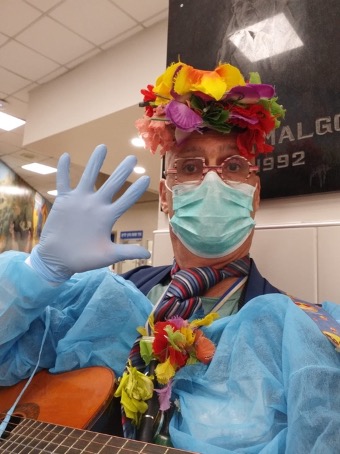September 22, 2020
Studies show that the feeling of happiness happens as a result of smiling – not the other way around, as is commonly thought.
In an interview with DD ‘DR. PROFESSOR’, Dr. Amnon Raviv shares how medical clowning is helping fight corona and ‘healing the world’ through humour and love. “When critically ill patients see Raviv standing in the doorway, a huge smile instantly appears on their faces. For long moments at a time, they forget all of the medical, mental and emotional problems that surround them…when you can laugh about a painful subject, you reduce the fear and pain”.
“A person can reach the gates of death, God forbid, out of sadness. Then suddenly a person comes before him and smiles at him. He helps the sun shine for this person by greeting him with kindness. This act revives his spirit and saves him!” (from a Breslov Chassidic story).
There are so many blessings that we say to each other on Rosh Hashana that express our desire for a good and happy new year, one that will be different from the previous year. I decided to start the new year with a conversation with Dr. Amnon Raviv, the medical clown who puts a smile on the faces of so many patients, as well as hospitals’ medical staff.
“Israel’s ‘Dream Doctors’ are the only medical clowns in the world who have continued to work in hospitals since the beginning of the corona outbreak,” said Raviv. “Since corona became the backdrop of our lives, it’s been strictly forbidden to visit patients in Herzfeld. For patients with serious illness, this has added significant insult to injury- causing them to drop further into depression as a result of loneliness, disconnection from family and media sources reiterating the message that they are an at-risk population. I was asked to start coming to the hospital four times a week. I’ve tried to the best of my ability to raise their morale, to sing and laugh with them even from behind my mask, gloves, skirt and red nose. When you can laugh about a painful subject, you reduce the fear and pain,” he added.
Patients look forward to Raviv’s visit with anticipation and tell him how much the visits help them feel better. For long moments at a time, they forget all of the medical, mental and emotional problems that surround them. Raviv interacts with a wide range of patients, among them, those with mild conditions in the waiting rooms, as well as patients confined to their beds. When critically ill patients see Raviv standing in the doorway, a huge smile instantly appears on their faces.
It seems like there are many places in the world that are now exposed to the second wave of corona. What should the elderly do, stay at home until the end of this crisis
“Currently the situation in Israel made a turn for the worse and there is a three-week lockdown over the holidays. Last month, to the relief of many, one family member at a time was allowed to visit patients in hospitals. These kinds of decisions must take into consideration the benefits vs. the risks of isolation and should include not only the risk of physical health but mental health as well. Raviv explained, “it’s not enough for people to see their loved ones virtualy, they need in-person connection. If you keep a safe distance of two meters, then patients can and should be able to safely meet and interact with their families”.
Have you dealt with this issue personally?
“Yes. My mother is a resident of a nursing home that has been closed on and off for several weeks at a time. Every time a corona patient was found in her ward, everyone had to go into isolation. I saw first-hand how badly the isolation affected her. I told the director of the nursing home that we, her family, needed to visit her, even if only from a distance. We stood in front of her balcony, about ten meters away and talked to her. I told her how much I love her and being there showed her how much I care. This pandemic has caused her to feel so isolated, alone and depressed. It is our right, or rather our duty, to take care of her. We also celebrated her birthday together with my brother and sister. The nursing home management granted permission for us to meet with her outside in the garden at a safe distance from her. In my opinion, the risk of death from depression and isolation is equivalent to the risk of contracting the coronavirus.
Celebrities and politicians from every end of the political spectrum have come through Assaf Harofeh Hospital. “At the hospital there are no coalitions and there is no opposition.” Raviv laughed. “Everyone there is anxious. They’re just waiting for a clown to come and make them laugh to help reduce their anxiety. We’re all in the same boat and headed in the same direction- to hope for the best.”
Raviv has been working as a medical clown for almost two decades as part of the ‘Dream Doctors Project’, and has published many articles on medical clowning, including his book “Medical Clowning – The Healing Performance,” published by Siegel and the University of Chicago. Raviv is the first person in the world to have been awarded a doctorate in medical clowning. He currently divides his time between the Herzfeld Geriatric and Rehabilitation Hospital, the Oncology Department at Tel Hashomer and the emergency room at Assaf Harofeh. Among other things, he teaches at Tel Chai College and is currently planning a medical clowning workshop at the Academic College in the Western Galilee.
Raviv gets tested for corona on an ongoing basis to protect the safety of his patients. He’s exploring how to fight the coronavirus mentally and emotionally and continues to make life better for patients by putting a smile on everyone’s face.
“A smile costs nothing but gives much. It enriches those who receive without making poorer those who give. Some people are too tired to give you a smile. Give them one of yours, as none needs a smile so much as he who has no more to give”.
May it be a happy, healthy and sweet new year to all the people of Israel!
Excerpts translated from an article written by Anat Taner, published on Ynet
September 18, 2020

 Donate
Donate 
